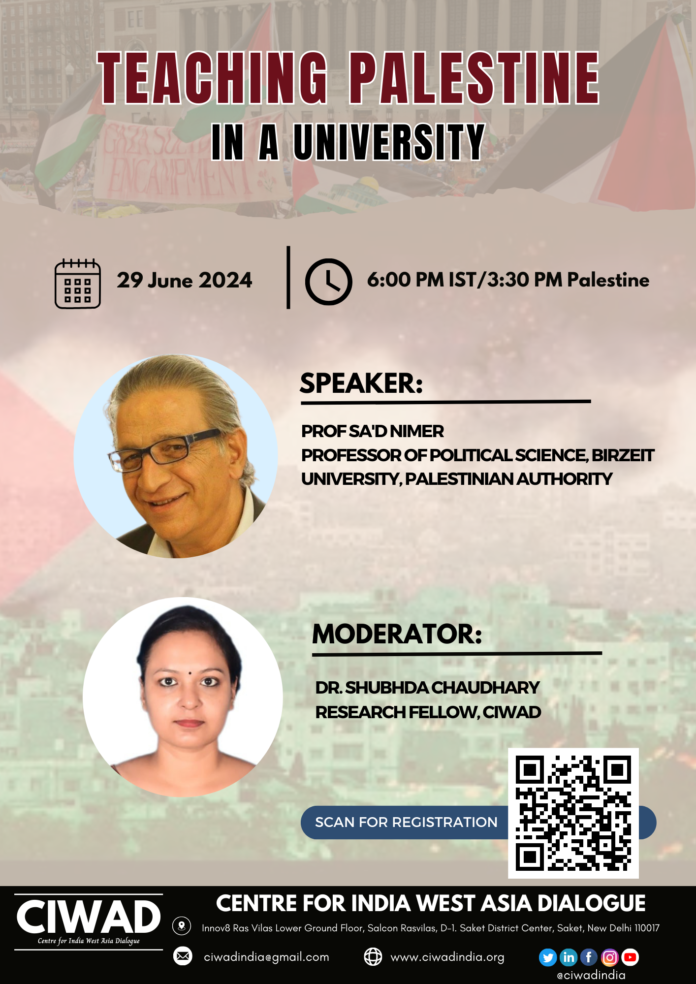Speaker – Prof. Sa’d Nimer, Professor of Political Science, Birzeit University, PA
Moderator – Dr Shubhda Chaudhary, Research Fellow, CIWAD
The Centre for India-West Asia Dialogue (CIWAD) convened an online talk on June 29, 2024, titled “Teaching Palestine in a University.” The discourse was led by Professor Sa’d Nimer from Birzeit University in the West Bank, with Dr. Shubhda Chaudhary serving as the moderator. Dr. Chaudhary initiated the session by contextualizing the recent wave of student protests across U.S. campuses advocating for a ceasefire in Palestine. She delineated the evolving definition of Palestine, the current pedagogical challenges amidst the ongoing destruction in Gaza, and the unreported gradual annexation of the West Bank by Israel.
Professor Sa’d Nimer articulated the lived experience of Palestinians under colonial occupation and the Zionist movement, which permeates all facets of life, including higher education. He underscored the pedagogical significance of field trips, which he employs to help students gain a practical understanding of Palestinian realities, thereby addressing and rectifying foreign prejudices. Nimer critiqued the role of media and the pervasive influence of colonial and Zionist narratives on the perceptions of international students, advocating for an education grounded in factual representation of the Palestinian situation, particularly in light of the human rights violations in Gaza post-October 7.
Nimer further explicated the severe disruptions to the educational process caused by Israeli-imposed roadblocks and checkpoints, which hinder students from attending classes and examinations. He highlighted the bureaucratic hurdles faced by foreign academics and students, who are often compelled to navigate the complexities of tourist visas with limited validity. Providing a historical overview, Nimer recounted the Israeli control over the Palestinian educational system since 1967, particularly the systemic interference in education from grades one to twelve, and the establishment of universities from 1974 onwards. He detailed the persistent efforts and strikes by students and faculty to maintain academic autonomy against Israeli interference.
The current educational environment is fraught with significant restrictions and daily challenges, including the intermittent closure of universities, the infiltration of campuses by disguised soldiers, and severe limitations on academic resources such as books, chemicals for laboratories, and electronic equipment. Nimer highlighted the routine arrests of professors and students, and the memorialization of student casualties on campus. He also addressed the exacerbated economic and employment crises post-October 7, with unemployment rates surging and nearly 200,000 individuals affected. The withholding of tax revenues by Israeli authorities further strains the financial stability of the Palestinian Authority, contributing to a significant brain drain as graduates seek employment opportunities abroad due to the paucity of local job prospects.
Nimer asserted that Hamas constitutes a legitimate political entity, with resistance recognized as a lawful right under international statutes. He pointed to the growing solidarity among Arab nations and the collective resistance against American and Israeli interests in the region. Dr. Chaudhary added her observations on Israeli security measures, the forced separation of families, and restrictions on religious practices at Al-Aqsa Mosque. She elaborated on the systemic censorship and surveillance that stifles Palestinian academic and literary expression, both within and beyond the West Bank. She also critiqued the monopolization of the anti-Semitism discourse, advocating for the recognition of Islamophobia and anti-Arab sentiments as forms of anti-Semitism.
The talk emphasized the profound challenges confronting Palestinian education under occupation, highlighting the resilience of Palestinian students and educators. The discourse emphasized the critical need for international solidarity and heightened awareness of the systemic adversities faced by Palestinian academia.


